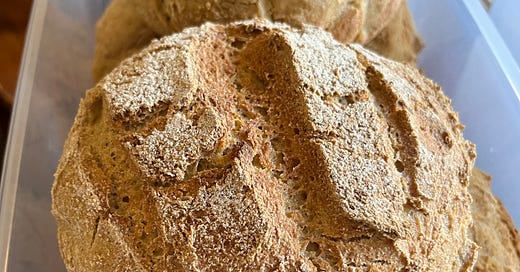When you have to be GF, is it really "good like bread"?
There is an Italian saying “Buono Come il Pane” or “Good like bread” — more broadly meaning “good as gold” in English. If you've read some of our earlier newsletters you know I've been learning Italian. What started as a “pandemic project” turned into a stubborn obsession, which is both good and annoying. (Feel free to ask me sometime for a language-learning reading list). But hey, it’s a pretty language and I love adapting Italian breads, using traditional recipes as a homebase from which I can share creative bread with others like you, va bene?
Back to the central idea here. If bread is the measuring stick for goodness and the shared thing that everyone agrees on as “this is good!!” then where does that put you if you are Gluten-Free? What happens when you are at a restaurant and out comes the wheat bread appetizer, crackling and golden, fragrant from the oven? How do you partake of that experience where everyone nods in unison and looks at each other and says “Ah yes, this is good”?
What if this wheat-based bread appetizer poisons you or causes you pain and regret for hours? Even if it is artisan, organic and sourdough?
And then what if the Gluten-Free breads that dot the grocery store shelves, “sub” at restaurants or otherwise promise all sorts of similarities to real bread — what if these creations are just not good to eat and maybe even cause their own distress?
Is any of this buono come il pane?
For today let’s define what buono come il pane means in many cultures. What is bread, and what does it provide to us as partakers?
Bread satisfies hunger
Bread holds lots of other foods and flavors
Bread is automatic and needs minimal preparation once purchased
Bread can be mystical
Bread centers our families and communities.
It is no accident that bread is a part of many community events and religious traditions, especially the Judeo-Christian ones: Think Holy Communion, Shabbat, or even a Pizza party!
Let’s face it: There is something both practical and amazing about wheat bread in its many shapes and flavors. It remains an essential even in our global environment of food choices and alternatives. Bread just works.
Except of course when it doesn’t.
As Urban Peasants we keep this list in mind. Though we don’t have all the answers and our recipes are continually under development, we try and consider what bread means. We seek to provide bread with as much nutrition and flavor as possible to you, the partaker.
In some small way I think we are getting there. At market there is often a complicated mix of emotions I see on your faces as you walk up. Two stories:
Perhaps you forgot to pre-order and you’re looking at our table, craning from afar, hoping that one of your favorite loaves is still there waiting for you to grab and take home, where you’ll eat, share, and maybe, just maybe, exclaim this is “buono come il pane.”
And then, for those of you who pre-ordered, there is a look of confidence and satisfaction—you are picking up the bread you carefully chose. You selected it to slice and prepare as your weekly provision, or to share with others in your community, sure of the nutrition, energy, and meaning it provides to all. After all, this is buono come il pane.
In both situations we would agree, this is buono como il pane, and it brings a smile to your face. We certainly hope so!
As always, grazie mille!
Flavio and Beth for the Urban Peasants





